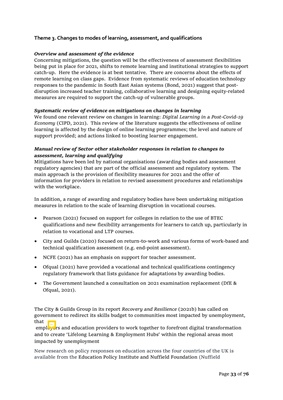
Page 33 of 76
Theme 3. Changes to modes of learning, assessment, and qualifications
Overview and assessment of the evidence
Concerning mitigations, the question will be the effectiveness of assessment flexibilities
being put in place for 2021, shifts to remote learning and institutional strategies to support
catch-up. Here the evidence is at best tentative. There are concerns about the effects of
remote learning on class gaps. Evidence from systematic reviews of education technology
responses to the pandemic in South East Asian systems (Bond, 2021) suggest that postdisruption
increased teacher training, collaborative learning and designing equity-related
measures are required to support the catch-up of vulnerable groups.
Systematic review of evidence on mitigations on changes in learning
We found one relevant review on changes in learning: Digital Learning in a Post-Covid-19
Economy (CIPD, 2021). This review of the literature suggests the effectiveness of online
learning is affected by the design of online learning programmes; the level and nature of
support provided; and actions linked to boosting learner engagement.
Manual review of Sector other stakeholder responses in relation to changes to
assessment, learning and qualifying
Mitigations have been led by national organisations (awarding bodies and assessment
regulatory agencies) that are part of the official assessment and regulatory system. The
main approach is the provision of flexibility measures for 2021 and the offer of
information for providers in relation to revised assessment procedures and relationships
with the workplace.
In addition, a range of awarding and regulatory bodies have been undertaking mitigation
measures in relation to the scale of learning disruption in vocational courses.
• Pearson (2021) focused on support for colleges in relation to the use of BTEC
qualifications and new flexibility arrangements for learners to catch up, particularly in
relation to vocational and LTP courses.
• City and Guilds (2020) focused on return-to-work and various forms of work-based and
technical qualification assessment (e.g. end-point assessment).
• NCFE (2021) has an emphasis on support for teacher assessment.
• Ofqual (2021) have provided a vocational and technical qualifications contingency
regulatory framework that lists guidance for adaptations by awarding bodies.
• The Government launched a consultation on 2021 examination replacement (DfE &
Ofqual, 2021).
The City & Guilds Group in its report Recovery and Resilience (2021b) has called on
government to redirect its skills budget to communities most impacted by unemployment,
that
employers and education providers to work together to forefront digital transformation
and to create 'Lifelong Learning & Employment Hubs' within the regional areas most
impacted by unemployment
New research on policy responses on education across the four countries of the UK is
available from the Education Policy Institute and Nuffield Foundation (Nuffield